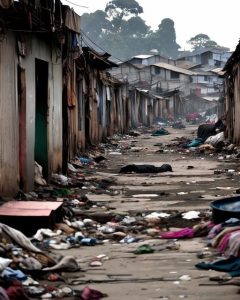Economic inequality in America is like a storm cloud looming over our social institutions, casting shadows of doubt, division, and missed opportunities within communities. This study delves into the intricate web of consequences stemming from the ever-widening economic gap, from fraying social bonds to shaking the foundations of trust in crucial establishments like government and the economy. By dissecting how economic inequality impacts our social framework, this research sheds light on the pressing call for fair policies and systemic changes to tackle the root issues of inequality and foster a society that embraces everyone.
The landscape of economic inequality in America paints a stark picture, with profound effects rippling through our social institutions and the very fabric of society. The chasm between the affluent few and the rest of the populace deepens existing divides, shaking the core principles of fairness and equal opportunity. This examination navigates the profound impacts of economic inequality on social institutions and the hurdles it raises in the quest for a more balanced and just society.
At the heart of economic inequality lies the unraveling of social ties within communities. As wealth and opportunity diverge, the tapestry of trust and solidarity weakens, paving the way for increased fragmentation and isolation. This breakdown of social cohesion hampers communities in uniting to tackle shared obstacles, amplifying fractures along lines of race, ethnicity, and income.
The consolidation of wealth and influence in the hands of a privileged few weakens the safety nets crucial for supporting the vulnerable. As resources dwindle for marginalized groups, essential services like healthcare, education, and housing slip further out of reach. This cycle of scarcity deepens disparities, perpetuating cycles of poverty and widening the breach between the privileged and the disadvantaged.
Economic inequality corrodes faith in vital institutions such as government and the economy, painting them as partial to the elite rather than serving the broader populace. Perceptions of corruption and unfairness chip away at institutional credibility, fostering disillusionment and suspicion among the masses.
The persistence of economic inequality stifles avenues for upward mobility, locking access to opportunities behind the gates of socioeconomic status. This cycle perpetuates generations of advantage and disadvantage, stifling progress and reinforcing existing inequalities. The lack of economic mobility not only hampers individuals and families but also stifles societal growth and innovation.
Tackling economic inequality demands a robust suite of fair policies that target the roots of inequality and foster inclusive economic progress. This entails progressive taxation, investments in education and workforce development, and fortifying social safety nets. Equally critical are fair wages, labor rights, and access to affordable healthcare and housing to bridge the gap and pave the way for social mobility.
Economic inequality looms as a formidable adversary to America’s social institutions, jeopardizing trust, unity, and opportunities for growth within communities. The widening wealth chasm not only deepens social rifts but also weakens safety nets and trust in pivotal establishments. Confronting economic inequality necessitates bold, fair policies that champion the needs of all members of society, paving the way for an inclusive and equitable future for all.

